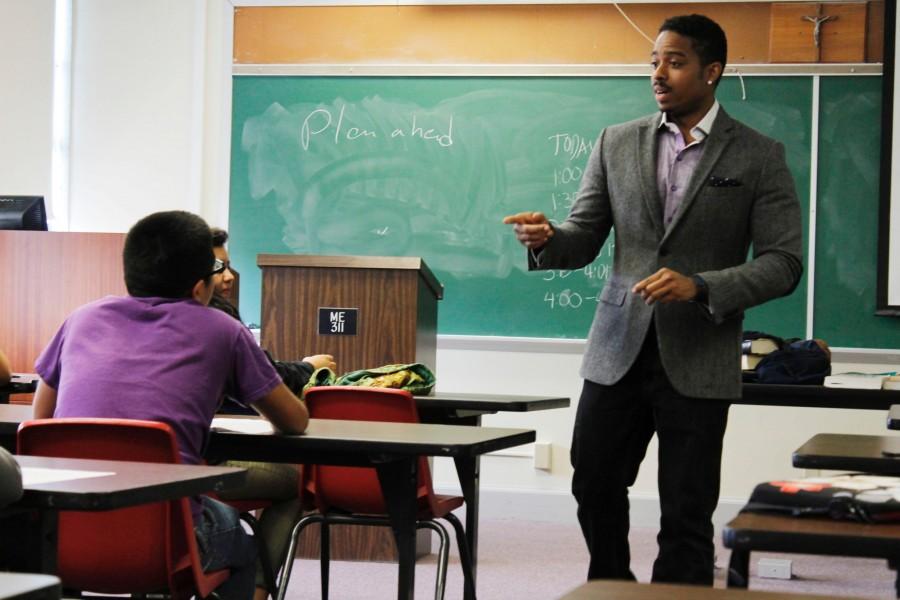It’s 1:30 p.m. on a Saturday, and in Mercy Hall, Adam Stelly, an economics junior at Loyola, is teaching alcohol awareness to high school students.
The Pre-college Incubation Experience for Majors in Mathematics and the Natural Sciences is a program that targets high school students from poor financial backgrounds interested in continuing to study math and science in college. Between 25 to 30 students are selected to attend a five week summer session and meet every other Saturday for classes during the academic year at Loyola University.
The program extends past normal classroom lectures to teach subjects like conflict resolution, health and wellness and financial literacy, Alvaro Alcazar, the program’s director and Twomey Center for Peace through Justice director of urban partners, said.
He said he believes the project emphasizes the founding principles of the Twomey Center. The purpose of the program is to revive “a tradition Fr. Louis Twomey started in 1949 of bringing high school and college students together to address issues of peace and social justice,” according to the Loyola website.
Alcazar and Stelly’s efforts are part of a larger issue to inspire low-income, high school students to succeed in a university setting through education.
The program is a project underneath the Twomey Center for Peace through Justice, and it empowers students to choose careers in those fields, Alcazar said.
While Stelly’s topic was health and wellness, he joined the program after Luke Livaudais, economics junior, asked him to teach one of the program’s classes.
Livaudais and Peter Kovach, an economics junior, began teaching some of the program’s classes about a year ago because they believe financial literacy is an important topic students should be familiar with.
“We strive to empower the youth by teaching practical life skills,” Livaudais said.
Kovach said he realized the importance of financial literacy after a friend was unable to continue at his college because of financial mismanagement.
“I realized that this was a big issue and that it was necessary to start a financial literacy program aimed specifically at teens, in order to change the outlook on personal finance in the future,” Kovach said.
Livaudais and Kovach believe financial literacy is crucial for students to learn, so they have branched out and founded Holomua Life Learning in addition to teaching courses at the program.
Kovach said he believes their non-profit will benefit the community.
“Currently there is no program similar to ours in New Orleans, which makes the need for a program like ours even more important. Many Americans do not have a grasp on their personal finances, especially in urban areas. Holomua breathes to change that,” Kovach said.
He said he hopes to see continued growth in the future, but he said he is inspired by the amount of growth the program has already made from the expanded curriculum to the number of volunteers.
“Holomua has grown tremendously within the past few months with new partnerships and more volunteers. As a result, with more people working with us we have started to create bylaws so we can have a firm structure to operate under,” Kovach said.
While the program remains a partner of Holomua Life Learning, they have created other partnerships with the Youth Empowerment Project, Imua family services and Kihei youth center.
With the growth of the Holomua Life Learning program, the pre-college program has also extended their reach.
Sam Bradley, the pre-college program’s associate director, said the program has made strides towards growth with the added field trips and access to facilities, including NASA, the University of New Orleans’ marine lab and the FBI forensic crime labs.
With nine of the program’s graduates enrolled at Loyola, Bradley said he hopes participants will give back to future students.
“I would say that we would want people who graduated from the program to come back and tutor students,” Bradley said.
He said he believes one of his goals for the program is for all participants to leave with the requirements to enter a university.
“For me, I look at numbers a lot, and I would like 100 percent of students to get accepted in college. I believe the number right now is 98 percent,” Bradley said.
Stelly took a more hands on approach when he addressed the students in the program’s classroom. He said he believes this type of education will benefit the students for years to come.
“Everything that we do for you guys, we do it so it can help you long term,” Stelly said.
Lucy Dieckhaus can be reached at ljdieckh@loyno.edu








